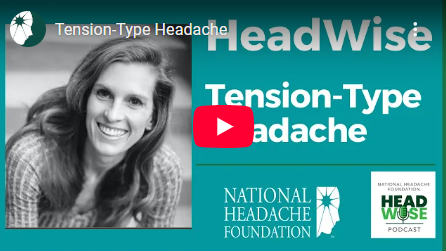What is a Tension-Type Headache?
Tension-type headache is one of the most common types of headache. It is often described as a constant, dull pain or pressure, typically affecting both sides of the head. “Researchers estimate more than 70% of people have episodic tension headaches.”.
Unlike migraine attacks, a tension-type headache usually does not come with symptoms like nausea, vomiting, or sensitivity to light and sound. Although they can be uncomfortable and disruptive, tension-type headache is generally less disabling than migraine.
Despite their name, tension-type headache is not necessarily caused by emotional or physical tension. The term “tension” can be misleading, as stress can trigger almost any headache type, including migraine attacks and cluster headache.

Frequency of Tension-Type Headache
Healthcare practitioners classify tension-type headache as:
- Infrequent episodic: Headache happens one day a month or fewer.
- Frequent episodic: You have one to 14 headache days every month for at least three months.
- Chronic: You have more than 15 headache days every month for three months.
Symptoms of Tension-Type Headache
Tension-type headache is characterized by the following symptoms:
- Location of Pain: Typically felt on both sides of the head.
- Pain Type: Described as a pressing or tightening sensation, not throbbing.
- Intensity: Mild to moderate pain that is steady rather than pulsating.
- Duration: Can last anywhere from 30 minutes to several hours or even days.
- Absence of Additional Symptoms: Unlike migraine, tension-type headache usually does not involve nausea, vomiting, or visual disturbances like auras. However, mild sensitivity to light or noise may be present.
Causes of Tension-Type Headache
The exact cause of tension-type headache is not fully understood, but several factors are believed to contribute to their development:
- Stress: Emotional or mental stress is a leading trigger for tension-type headache. This may include work pressure, personal issues, or even worrying about health.
- Muscle Tension: Tightness in the neck, scalp, or shoulder muscles due to poor posture, sitting for long periods, or straining can lead to tension-type headache.
- Fatigue: Lack of sleep or physical exhaustion can also trigger tension-type headache.
- Environmental Factors: Noise, bright lights, or uncomfortable environments may play a role in causing or worsening tension-type headache.
- Sinus or Allergies: Low-grade sinus disease can also mimic the symptoms of a tension-type headache.
Treatment Options for Tension-Type Headache
Managing tension-type headache often involves a combination of lifestyle changes, medication, and therapeutic interventions. Treatment options include:
Over-the-Counter Medications:
- Pain Relievers: Non-prescription medications such as ibuprofen, aspirin, and acetaminophen are commonly used to relieve the pain of tension-type headache.
Relaxation Techniques:
- Stress Management: Practices like deep breathing exercises, yoga, and meditation can help reduce stress, a common trigger for tension-type headache.
- Physical Therapy: Muscle tension is often addressed through exercises designed to strengthen and stretch the muscles in the neck and shoulders.
Preventive Medications:
- Antidepressants: In cases of chronic tension-type headache, low doses of antidepressants (e.g., amitriptyline) may be prescribed to reduce the frequency and severity of headache attacks.
Lifestyle Adjustments:
- Sleep Hygiene: Establishing a regular sleep schedule and ensuring you get adequate rest can help prevent tension-type headache.
- Ergonomic Changes: Adjusting your workstation or improving your posture can reduce muscle strain that may contribute to tension-type headache.
Alternative Therapies:
- Massage Therapy: Massaging the muscles around the head, neck, and shoulders can relieve tension and prevent headache.
- Acupuncture: Some people find relief from tension-type headache through acupuncture, which involves the insertion of fine needles into specific points on the body to relieve pain and stress.
When To Talk With a Healthcare Provider
While tension-type headache is common and often manageable with home treatment, frequent or severe headache attacks should not be ignored. If you experience headache attacks that:
- Happen more than twice a week,
- Last for long periods or worsen over time,
- Are accompanied by other symptoms like vision changes or loss of consciousness,
It is essential to consult a healthcare provider for proper diagnosis and management.
This resource is based on HeadWise Episode 104, Tension-Type Headache with Vince Martin, MD.
Published 10/22/2021
Learn More Through Personal Stories

From high school through her career, Megan has balanced the demands of daily life while managing frequent tension headache and migraine attacks, a constant companion for most of her life.

KC has navigated the complex and often misunderstood world of migraine and headache disorders. KC came across a lifelong journey of misdiagnoses, trial-and-error treatments, and ultimately, self-advocacy.
Subscribe for News and Updates
Stay informed with the latest news, updates, and episodes from the HeadWise podcast.

